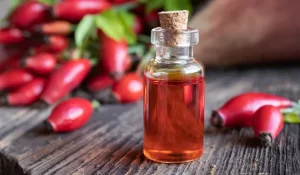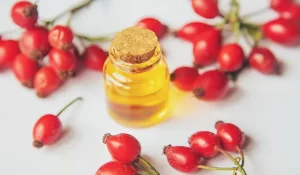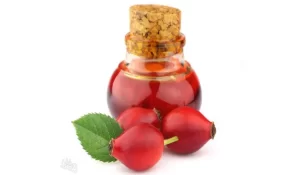Table of Contents

Rosehip oil, forget diamonds, is truly a girl’s (and guy’s!) best friend.
Tucked away within the humble fruit of the rose, this little oil packs a potent punch of natural goodness, ready to transform your skin from dull to dazzling.
But don’t be fooled by its delicate origins, rosehip seed oil is a force to be reckoned with.
Imagine a world where wrinkles fade, scars become whispers of the past, and your skin glows with a youthful radiance you thought lost forever.
Well, step aside, fairy tales, because rosehip seed oil is making this fantasy a reality.
Dive into this blog post and prepare to be swept away by the enchanting world of rosehip seed oil.
We’ll unveil its potent secrets, explore its wondrous benefits, and guide you on your journey to a healthier, happier you.
So, grab your favorite cuppa, settle in, and let’s unlock the hidden power of this botanical beauty. Are you ready to bloom?
General facts about rosehip seed oil:

Overview:
For generations in Patagonia, the rosehip, a small fruit with a vibrant history, has been revered for its healing properties.
From soothing skin conditions to aiding wound recovery, its effectiveness was passed down through generations, whispered through stories, and shared knowledge.
However, it wasn’t until the late 20th century that science finally confirmed what tradition had long known.
A thorough study conducted by the Faculty of Chemistry and Pharmacology at the University of Concepción in Chile shed light on the rosehip’s remarkable utility, placing its efficacy on a firm scientific foundation.
The secret to the rosehip’s success lies in its unique composition, particularly its abundance of fatty acids.
Through a meticulous cold-pressing process, the oil extracted from the plant’s flower reveals a treasure trove of these essential components.
Among them are unsaturated fatty acids, like linolenic acid, which play a crucial role in cellular regeneration and growth.
Saturated fatty acids, such as natural tretinoin, contribute to their potent astringent properties.
And finally, the essential fatty acids omega 3, 6, and 9, fundamental for overall health and well-being, complete this potent mix.
This unique combination of fatty acids empowers rosehip oil to act as a natural healing agent, valued in both the medical and cosmetic realms.
Its effectiveness extends to treating wounds, sutures, burns, marks on the epidermis, and other skin damage requiring regeneration, earning its place as a trusted tool for restoration and repair.
Extraction of rosehip seed oil:

Rosehip oil, a treasure trove of natural goodness, holds immense value for both medicinal and beauty purposes.
But how does this precious oil journey from humble seed to potent elixir?
The secret lies within the rosehip itself, the fruit of the wild dog rose shrub.
Nestled beneath the delicate petals, these vibrant red or orange spheres harbor the key: the rosehip seeds.
Unlike its namesake, rose oil extracted from fragrant petals, pure rosehip oil reveals its essence solely through the gentle process of cold-pressing the seeds.
For those seeking a simpler path, a DIY approach awaits.
By immersing rose petals in almond oil, you can create a less refined version, aptly called rosehip macerate.
Though less concentrated than its cold-pressed counterpart, this homemade blend retains the potent benefits, mirroring those found in commercially available options or even luxury cosmetics.
So, whether you choose the traditional cold-pressing method or embark on a DIY adventure, one thing remains certain: unlocking the magic of rosehip oil opens a door to natural solutions for both health and beauty.
Rosehip seed oil health benefits:

Skin benefits:
Quenching Dryness:
Bid farewell to dry, dehydrated skin with the power of vitamin E.
Rosehip oil is a rich source of this essential vitamin, known for its ability to trap moisture within the skin cells, leaving it feeling hydrated, supple, and revitalized.
Unlike many oils, rosehip oil absorbs effortlessly, leaving behind a luxurious feel without any greasy residue.
Even sensitive skin can benefit from its gentle, anti-inflammatory properties, soothing irritation and restoring comfort.
Calming Acne and Rosacea Flare-Ups
For those struggling with acne, rosehip seed oil can be a game-changer.
Its anti-inflammatory properties help calm inflamed pimples, including papules, pustules, nodules, and superficial cysts.
Furthermore, vitamin A and linolenic acid work together to regulate sebum production, preventing clogged pores and the formation of blackheads and whiteheads.
Even rosacea sufferers can find relief in rosehip seed oil.
Its abundance of ascorbic acid, phenolic compounds, and essential fatty acids strengthens the skin’s natural barrier, protecting it from irritants and preventing dryness and flaking.
This, in turn, leads to a more comfortable and balanced complexion.
Cellular Rebirth:
Unlock the secret to youthful skin with the potent blend of essential fatty acids in rosehip oil.
Omega-3, 6, and 9 work hand-in-hand to stimulate collagen and elastin production, the building blocks of firm, youthful skin.
These fatty acids act like a natural architect, rebuilding the skin’s structure, reducing the appearance of fine lines and wrinkles, and revealing a radiant, youthful glow.
Fading Imperfections:
Rosehip oil isn’t just about pampering; it’s a powerful tool for tackling scars, stretch marks, and uneven pigmentation.
The presence of antioxidants like beta-carotene and vitamin C helps diminish the appearance of scarring and even out skin tone.
By promoting new skin cell formation, rosehip oil helps fade imperfections and reveal a more flawless, radiant complexion.
Whether you desire age-defying rejuvenation, deep hydration, or a solution for blemishes, rosehip oil offers a natural and effective way to achieve your skin goals.
Precautions before you use rosehip seed oil :

Nature’s remedy for healthy skin, rosehip essential oil is derived directly from the rosehip fruit.
Its naturalness ensures minimal risk of irritation, making it suitable for various skin types.
Packed with nourishing, moisturizing, and regenerative properties, this oil can work wonders on all skin types seeking its benefits.
However, a word of caution is necessary for oily skin.
While rosehip’s moisturizing power is a boon for most, it can be counterproductive for oily skin.
Excessive use can clog pores and lead to acne breakouts.
Therefore, moderation is key when using rosehip essential oil on oily skin.
Embrace the natural goodness of rosehip oil while being mindful of your skin’s unique needs.
Using rosehip seed oil:

Rosehip oil, a natural extract known for its potent properties, offers a plethora of benefits for both your skin and hair.
Its gentle nature makes it readily absorbed, allowing for direct application.
Let’s explore the diverse ways you can incorporate this versatile elixir into your beauty routine.
On the Hair:
After washing your hair, towel-dry it and apply a few drops of rosehip oil to your damp hair.
Focus on the ends and work your way up to the scalp.
The oil’s nourishing properties penetrate deep into the hair shaft, repairing damage and preventing future breakage.
This leaves your hair feeling soft, manageable, and full of shine.
On Marks:
Rosehip oil’s regenerative properties make it a powerful tool for tackling scars, stretch marks, and blemishes.
Apply a few drops directly to the affected area and massage gently.
Over time, you may see a reduction in scar visibility, fading of stretch marks, and a diminished appearance of blemishes.
Additionally, the oil’s calming properties can soothe irritated skin.
On the Body:
Treat your entire body to the benefits of rosehip oil by applying a few drops to clean your skin after showering or bathing.
Massage it in until fully absorbed.
This practice helps lock in moisture, leaving your skin feeling nourished and radiant.
The oil’s natural elasticity-boosting properties can also contribute to smoother, firmer skin.
On the Scalp:
If you struggle with a dry or damaged scalp, rosehip oil can offer relief.
Apply a few drops directly to your scalp and massage gently before washing your hair.
For deeper conditioning, leave the oil on overnight by covering your hair with a shower cap or plastic wrap.
You can then proceed with your usual washing routine.
Rosehip oil helps combat scalp dryness, soothes irritation, and promotes a healthy environment for hair growth.
On the Face:
After cleansing your face, warm a few drops of rosehip oil in your hands.
Gently massage it onto your face and décolleté in upward strokes, focusing on areas prone to dryness.
This simple application delivers a surge of hydration, leaving your skin feeling soft and supple.
Regular use can help prevent dryness, reduce the appearance of wrinkles and crow’s feet, and even soothe chapped lips.
Additional Tips:
- Enhance your routine by mixing rosehip oil with other nourishing oils like argan or jojoba.
You can also add a few drops to your favorite moisturizer for a boost of hydration and antioxidants. - Consistency is key to reaping the full benefits of rosehip oil.
Aim to apply it twice daily, once in the morning and again before bed. - Before applying any new product to your face, it’s crucial to perform a patch test.
Apply a small amount of oil to your inner arm and wait 24 hours to check for any allergic reactions. - To preserve the potency of your rosehip oil, store it in a cool, dark place away from direct sunlight.
By incorporating rosehip oil into your daily routine, you can unlock a treasure trove of benefits and achieve a healthy, radiant glow from head to toe.
Remember, patience and consistency are key to unlocking the full potential of this natural beauty wonder.
Storing rosehip seed oil:

Rosehip seed oils offer a plethora of benefits for your beauty routine, but you may have noticed that over time, they can change color and develop an unpleasant odor.
This is a natural process called oxidation, caused by exposure to light, air, heat, and even the container itself.
Unlike essential oils, which boast longer shelf lives at room temperature, rosehip seed oils are more delicate and require special attention for optimal preservation.
Maximizing Shelf Life:
- First Cold-Pressed virgin rosehip seed Oils: Choose oils packaged in opaque, lightly tinted glass bottles.
This helps shield the oil from damaging light. - Tight Closures: After each use, ensure the bottle is tightly sealed to minimize air exposure.
- Storage Location: Select a cool, dry, and dark place away from sunlight, humidity, and heat sources.
- Refrigeration for Sensitive Oils: Oils like rosehip seed oil are particularly prone to oxidation and benefit from refrigerator storage.
Expected Lifespan:
- Unopened Oils: When stored under ideal conditions, unopened vegetable oils can retain their potency for approximately 12 months.
- Opened Oils: Once opened, the oxidation process begins. “Sensitive” oils like those mentioned above typically last 6-12 months.
